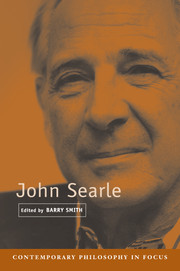Book contents
- Frontmatter
- Contents
- List of Contributors
- 1 John Searle: From Speech Acts to Social Reality
- 2 From Speech Acts to Speech Activity
- 3 Intentions, Promises, and Obligations
- 4 Law
- 5 Action
- 6 Consciousness
- 7 The Intentionality of Perception
- 8 Sense Data
- 9 The Limits of Expressibility
- 10 The Chinese Room Argument
- 11 Searle, Derrida, and the Ends of Phenomenology
- Further Reading
- Index
4 - Law
Published online by Cambridge University Press: 05 June 2012
- Frontmatter
- Contents
- List of Contributors
- 1 John Searle: From Speech Acts to Social Reality
- 2 From Speech Acts to Speech Activity
- 3 Intentions, Promises, and Obligations
- 4 Law
- 5 Action
- 6 Consciousness
- 7 The Intentionality of Perception
- 8 Sense Data
- 9 The Limits of Expressibility
- 10 The Chinese Room Argument
- 11 Searle, Derrida, and the Ends of Phenomenology
- Further Reading
- Index
Summary
LAW IN SEARLE
The law is a system of verbal interactions. It is the arena of speech acts par excellence. What we do in the law is to make claims, justify violations, argue precedents, assert interpretations of statutory language, and seek social stability by convincing others that a certain rule is indeed “the law.” All of these interactions require language. The idea of law without language is about as plausible as the idea of baseball without balls and bats.
Legal examples play a prominent part in John Searle's thinking about language. The examples that appeal to him are precisely those that illustrate verbal interaction in reliance on legal rules. Thus the law provides some of the best examples of performatives. Saying “I do” in a marriage ceremony effects the marriage. Saying “I divorce you” three times in certain Muslim countries terminates the marriage. Saying “This is yours” effectively transfers title under certain conditions.
These verbal expressions are performatives in the sense that the very act of reciting the words brings about a change in legal relationships. There are also performatives in areas outside the law. Games provide sterling examples. When the referee calls “Strike three,” he declares the batter out. Games are like legal systems in the sense that they rest on accepted rules that express a common understanding about the practical consequences of reciting words under certain circumstances.
These performatives provide the foundation for Searle's theory of constitutive rules. Constitutive rules stand in contrast to regulative rules.
- Type
- Chapter
- Information
- John Searle , pp. 85 - 101Publisher: Cambridge University PressPrint publication year: 2003
- 7
- Cited by

